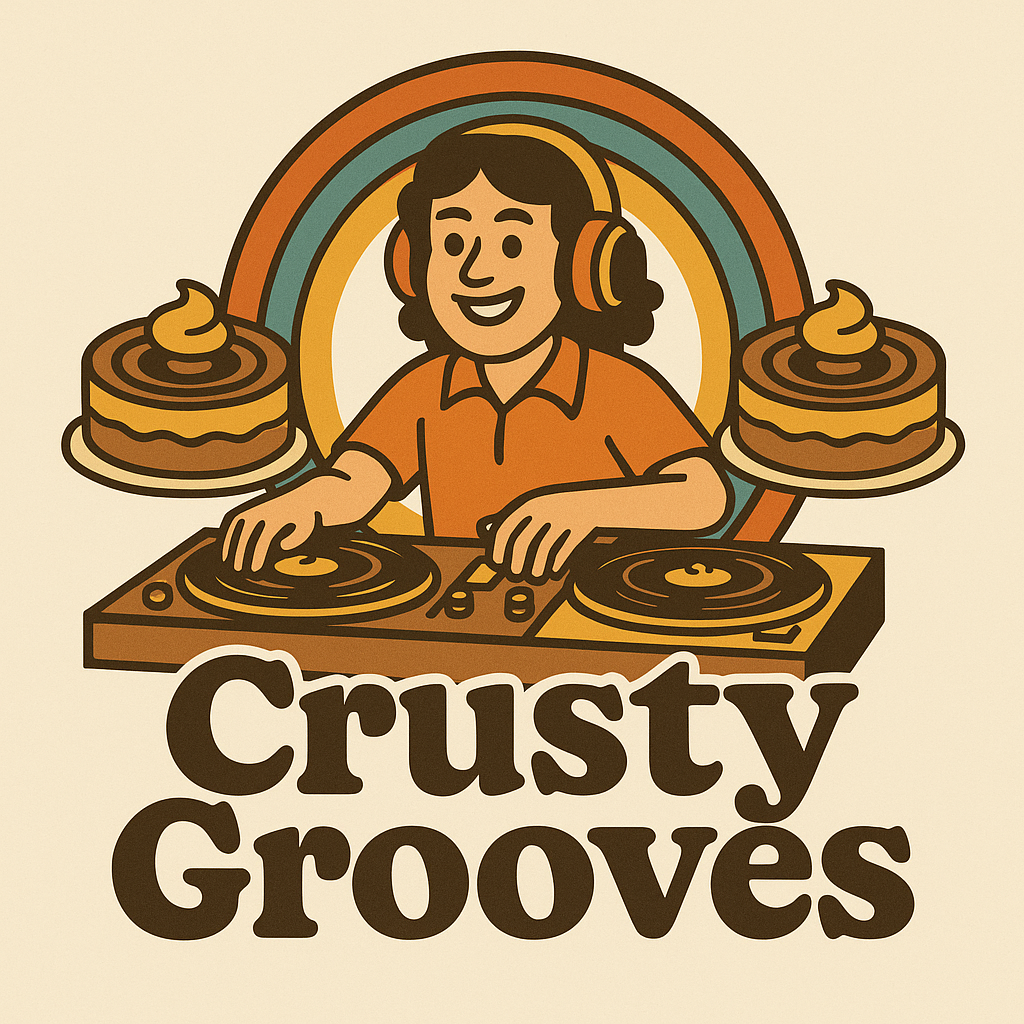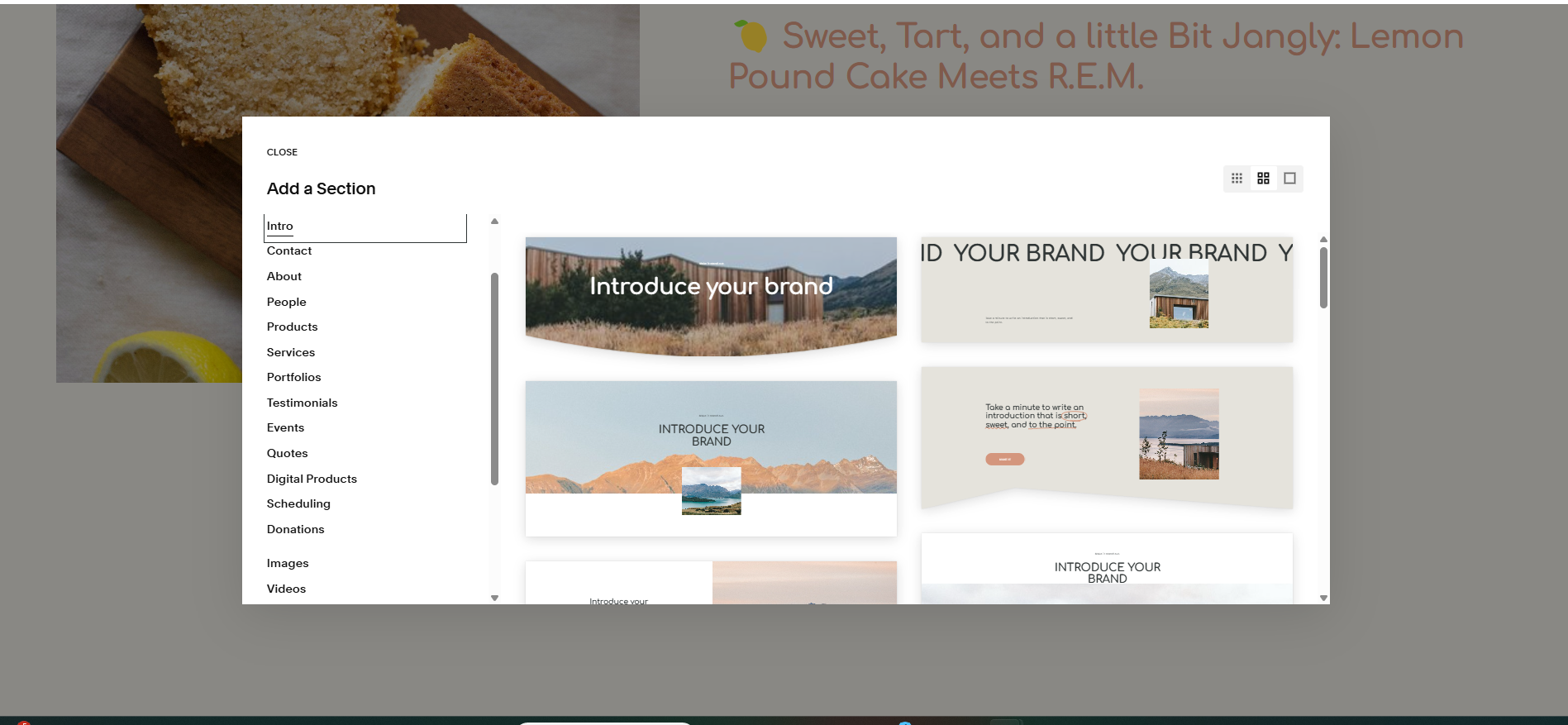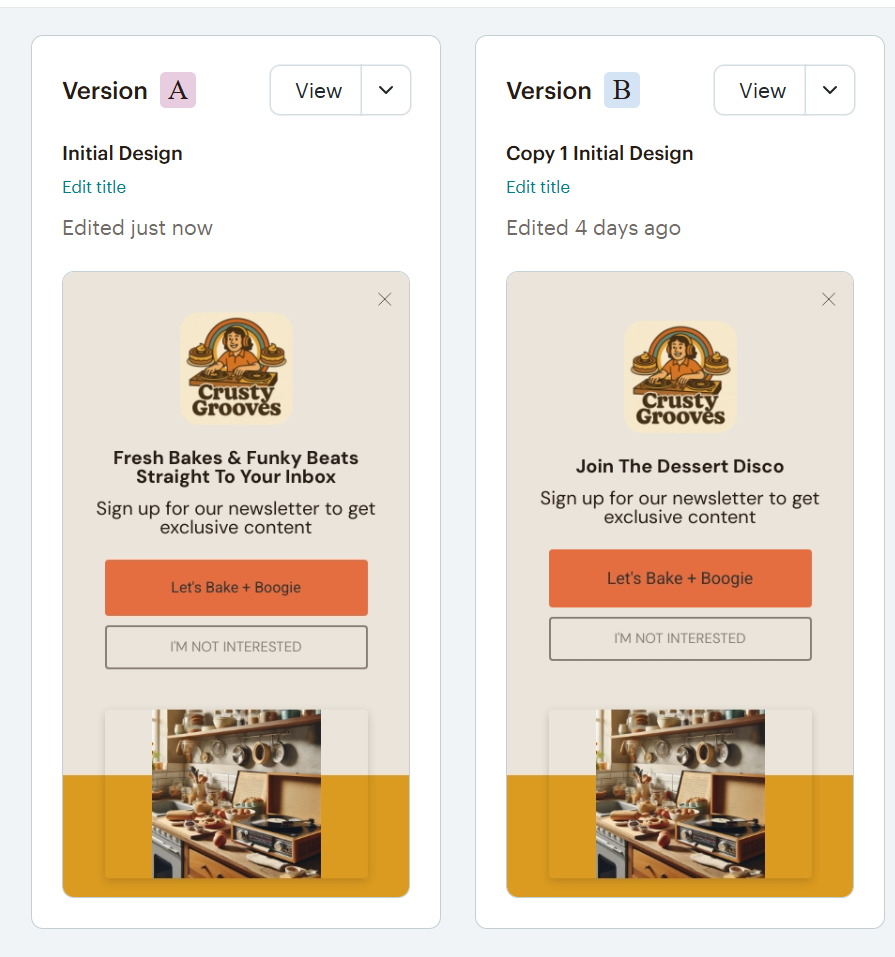Crusty Grooves: A Ceative Test Kitchen for My Digital Marketing Skills
SEO Strategy
Dive into the full audit process: keyword targeting, technical fixes, and measurable improvements in performance.
Email Campaign
Explore how I designed, tested, and automated an email campaign to engage readers and drive return visits
It all starts with an idea
The original idea for this blog came in 2023, born from a need for a creative outlet. I launched a site on Wix called robinsbakingtunage.com and named the blog Bakin’ n Shakin’ — a playful concept pairing homemade bakes with vinyl records.
The site, though well-intentioned, was a bit chaotic. The design was rough, the posts were scattered, and while I’d heard of SEO, I didn’t implement any strategy. I hadn’t yet considered branding, structure, or how to build something with staying power. After a few months, and in the middle of a career transition, I let the project go.
But the idea stuck with me.
After working on marketing campaigns at my former paralegal job, I realized I enjoyed the creative, strategic side of the work far more than the legal. That led me to complete a digital marketing program through UNC-Charlotte — and ultimately, to revive the blog as a way to sharpen my skills, build a brand, and follow the creative thread I dropped too soon.
Concepting Name and Brand
The aesthetic I wanted to bring to the table was rooted in the warm, offbeat charm of midcentury modern and 1970s design — bold patterns, mellow tones, and that soft, analog glow that feels like both memory and mood. It's a style that's resurfaced across Instagram, but for me, it never really went out. It’s where I feel at home.
Beyond visuals, I knew the voice of the blog had to reflect me — strange in the best way, a little tender, always chasing fun. My music taste lives in that same era: a crate-digging collection of funky classics, soft rock deep cuts, and the occasional mandolin moment.
That tone — retro, personal, playful — needed to be captured in the name, too. So I started brainstorming.
Name Idea
Bakin N’ Shakin
The Loaf Lounge
Butter Side-A
The Bake Track
Why it didn’t stick
Rhyming used too much
Already in use by a Chicago bakery
Maybe too playful for long term growth
Not enough vibe
Why I liked it
Fun & Lighthearted
Cozy & Loungy
Punny & Cute
Descriptive
Why “Crusty Grooves” Works
Combines baking + vinyl elements
Memorable, brandable, & just right amount of funky
Fits my voice and personality
Has a retro, 70s vibe that fits my visual style
From Wix to Squarespace
My first blog, Bakin N Shakin, was built on Wix. I found the editor limited and rigid once a template was in place. That experience helped me understand the importance of flexibility in both design and content structure.
Squarespace offered a smoother editing experience, better mobile responsiveness, and stronger visual templates for a non-designer like me. While its SEO tools are basic, they were enough to apply key fundamentals and rebuild with clarity
Phase 2: Building the Site + Strengthening SEO
Rebuilding Crusty Grooves was more than just a design update — it was a chance to apply everything I learned from my first blog attempt plus my recent Digital Marketing education and implement better structure, strategy, and SEO. Here's a breakdown of how I made the shift.
SMART Goal for SEO
Increase organic traffic to my blog section by 20% over 8 weeks by optimizing 3 existing articles and publishing 2 new keyword-targeted posts. I will track progress using Google Search Console/Analytics and show improvements in click-through rates and rankings.
Specific: Focuses on traffic and keyword performance
Measurable: Sets clear metrics (20% traffic growth, 5 keywords)
Achievable: Updating 3 posts + writing 2 new ones is realistic
Relevant: Aligned with my goal of showcasing SEO and keyword strategy
Time-bound: Tied to an 8-week timeframe
Initial SEO Improvements
✅ Custom SEO titles and meta descriptions on every page/post
✅ Keyword-friendly URL slugs (e.g., /lemon-pound-cake-rem)
✅ Alt text on all images for accessibility + search indexing
✅ Internal linking between blog and portfolio content
✅ Clean content hierarchy (H1–H3 headings used intentionally)
✅ Mobile-first layout for better UX and SEO
What are the Searchers’ Intents?
To effectively optimize the blog for on-page SEO, the first step is understanding the search intent behind the keywords our audience is using. By identifying what users are really looking for, we can tailor our content to meet their needs, improve engagement, and increase the chances of ranking higher in search results.
-
What they want: Recipes, baking techniques, or musical inspiration
Search examples:
“how to make praline bars”
“easy key lime pie recipe”
“What to listen to while baking
Opportunity: Rank for long-tail keywords that answer these questions directly in your content
-
What they want: To find my blog specifically or one like it
Search examples:
“music and food blog”
“crusty grooves blog”
Opportunity: Use strong branding, link-building, and metadata so the site is easily found then they already know (or remember) it
-
What they want: New, creative combinations or aesthetic lifestyle content
Search Examples:
“vintage recipe blog with playlists”
“aesthetic spring baking ideas”
“albums to pair with desserts”
Opportunity: SEO for emotion-driven queries - use blog tags, engaging titles, and good visuals
SEO Technical Audit with Screaming Frog
As part of my ongoing optimization work for Crusty Grooves, I conducted a technical SEO audit using Screaming Frog SEO Spider in combination with Google Search Console (GSC). My goal was to assess crawlability, indexing, and on-page structure across the site, then implement any needed corrections.
Key Findings
Blocked by robots.txt (internal)
Screaming Frog flagged a system-generated
/cartpage as blocked byrobots.txt, which raised a warning. I used GSC’s URL Inspection Tool to confirm this block was intentional and that the page was not appearing in Google’s index.
✅ No action required — the block aligns with site strategy.
Noindex Tag Found
The
/cartpage also carried anoindextag, which was consistent with its disallowed status and lack of relevance to users or search engines.
✅ Confirmed as correctly handled — no indexing necessary.
Missing H1 Tags on Pages
Several Pages were flagged for either missing or multiple
<h1>tags. I updated the template and individual posts to ensure that each page uses a single, descriptive H1 for better semantic structure and crawl clarity.
✅ Resolved — all core pages now follow best practices for H1 usage.
Missing Alt Text on Images
The audit revealed several images missing
altattributes, especially in older blog posts. I began systematically reviewing and updating alt text to improve accessibility and image-based SEO.✅ Resolved — all core pages now follow best practices
Email Marketing Campaign
If I was going to build the website and grow a following, I knew I’d need to gather an email audience and create an automated newsletter strategy. The goal was to cultivate a series of engaging messages that keep readers connected, curious, and coming back. Below is a breakdown of the campaign structure I developed — from welcome flows to content planning.
Campaign Goals and Strategies
The SMART goal for this campaign is within 90 days of launching Crusty Grooves' newsletter, generate 50+ email subscribers through the homepage pop-up, achieve a 40%+ open rate on the welcome email, and maintain an unsubscribe rate under 1%. These metrics are designed to build an engaged audience and demonstrate content resonance, even without monetization.
Creating a Subscriber Pop-Up
To build an email list for the blog, I started by creating a pop-up form encouraging visitors to subscribe to the newsletter.
I initially used Squarespace’s built-in pop-up tool for easy integration, but later switched to Mailchimp to gain more customization options and enable A/B testing.
My first A/B test focuses on the headline, keeping all other elements identical to isolate what drives more sign-ups. This marks the beginning of a structured testing approach to optimize performance.
The two headlines being tested are:
Fresh Bakes & Funky Beats Straight To Your Inbox
Join the Dessert Disco
This goal is to identify which messaging better captures the voice of the brand and encourages new readers to engage
Crafting and Automating a Welcome Letter
Using Canva, I designed a branded welcome email to be automatically sent when a subscriber joins the newsletter through the pop-up form. I drew from the Crusty Grooves color palette to create a visually cohesive experience that aligns with the overall aesthetic of the site.
The tone of the email reflects the brand voice — warm, quirky, and engaging — and clearly outlines what readers can expect from the newsletter. A strong call-to-action invites new subscribers to return to the blog and explore recent content, helping to increase engagement with existing posts.
To support this flow, I used Mailchimp to build a simple automation that triggers the welcome email immediately after sign-up via the pop-up form.
Scheduling the Newsletter
Goals Defined
Specific: Keep current subscribers engaged and returning to the site to view new blog posts and playlists.
Measurable: Achieve an average open rate of 35%, click-through rate of 10%, and unsubscribe rate below 1% over the campaign’s first 3 months.
Achievable: Use consistent content buckets (bake + record, playlists, baking tips), engaging subject lines, and biweekly cadence to build habit and trust.
Relevant: Builds community and strengthens the Crusty Grooves brand voice and readership.
Time-Bound: Measured from June to October (first campaign phase).
📬 Email Newsletter Strategy Overview
At this early stage of the blog and subscriber base, I focused on building a sustainable, thoughtful email strategy beginning in June. Rather than sending immediate campaigns, the goal was to develop a seasonal schedule aligned with the blog’s content flow and growth.
To keep things clear and balanced, I organized each newsletter into three content buckets:
Promote → Blog posts, Bake + Record pairings, and seasonal roundups
Inspire → Personal stories and curated playlists
Educate → Baking tips and music trivia
This helped ensure variety and audience value across each month.
Looking ahead, the strategy includes plans for audience segmentation—baking enthusiasts, music lovers, and full-experience followers—so future emails can be tailored based on interest. Low-effort content like playlists would go to music-forward subscribers, while recipe shortcuts or baking tips would land with the bake-first group.
Throughout the calendar, I prioritized a consistent brand voice, seasonal flow, and engaging subject lines that reflect the Crusty Grooves tone: warm, nostalgic, and a little quirky.













